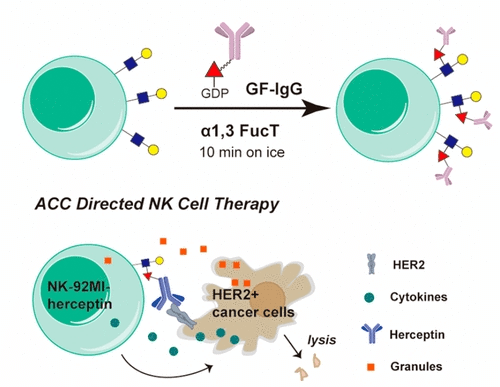Antibody Cell Conjugation (ACC)
As a leading CRO, BOC Sciences is dedicated to providing custom conjugation services to clients at the forefront of drug conjugation. Currently, employing live cells as therapeutics is an important direction of drug discovery. Antibodies can be immobilized directly on the cell surface to form antibody-cell conjugates (ACCs), and the modified cells may exhibit specific tumor targeting and enhanced cytotoxic killing. Thus, ACCs can be used as a novel approach to enhance the antitumor activity of cellular therapies. We are able to provide antibody cell conjugation services to meet your unique project needs. Our scientific team will work with you to create a scope of work to complete the project on time and within specifications.
Find out more with Drug Conjugation Services.
What is Antibody Cell Conjugation (ACC)?
Antibody-cell conjugate (ACC) is an exciting new direction in cell therapies. ACC is a cell-based immunotherapy that relies on chemical modifications to attache antibodies directly to immune cells, rather than genetic engineering. Molecules presented on the cell surface determine how cells interact with the external environment. Cell surface modifications are useful for studying cell-to-cell communication and downstream signaling. For example, chimeric antigen receptor T-cell (CAR-T) therapies typically contain modified monoclonal antibody single-chain variable fragments (scFv) that are genetically engineered to present on the T cells surface. However, genetic engineering is limited by technical complications and safety concerns, such as the inconsistent reproducibility of viral transduction efficiency of primary cells, heterogeneous expression levels, and the potential for endogenous gene disruption. Therefore, modifying cell surfaces using chemical tools has emerged as a complementary approach.
The antibody-cell conjugates driven by chemical modifications that antibodies can synthetically attach to T cells or natural killer (NK) cells without undergoing any gene modifications. Compared with CAR-T, ACCs do not have to undergo long-term culture with shortened process. While typical CAR-T therapies take about 3 weeks to culture, it may take about a few hours for ACC to attach the antibody to the cell surface.
 Fig 1. Enzymatic antibody-cell conjugates (Li, 2018)
Fig 1. Enzymatic antibody-cell conjugates (Li, 2018)
Our Methods
- Screening and selection of tumor-targeting antibody candidates.
- Binding of antibodies to immune cells by methods including but not limited to:
- Metabolic oligosaccharide engineering (MOE)
- Enzymatic glycoengineering approach
- Evaluation of ACCs activity by in vitro cytotoxicity assay and in vivo xenograft model.
Application of Antibody Cell Conjugation (ACC)
ACC technology uses live-cell compatible chemistry to conjugate tumor-targeting antibody to the surface of human immune cells. This new approach in the field of cell therapy development has the potential to dramatically enhance the ability of various cells including γδ T cells, NK-92 cells, CIK cells to recognize and engage the tumor by unlocking multiple receptor signaling pathways. ACCs have the the potential to overcome the barriers that cell therapies effectively targeting tumors.
Our Advantages
- Various conjugation methods through chemical modification
- A variety of ACC activity evaluation methods
- People and suites that specialize in ACC development, manufacturing, and testing
- Data analysis, detailed report with results and discussion
- Cost-effective and high-quality products
Frequently Asked Questions (FAQ)
Unlike solution-phase conjugation or solid-phase immobilization, Antibody Cell Conjugation directly couples antibodies onto intact cell surfaces. This enables real-time studies of cell-molecule interactions, receptor mapping, and surface functionalization under physiological conditions.
Different conjugation strategies—such as amine coupling, thiol-maleimide reactions, or click chemistry—can alter how antibodies orient on the cell surface. Selecting a suitable method ensures proper antigen recognition while minimizing steric interference or membrane disruption.
Factors such as cell type, membrane composition, and surface protein abundance significantly affect conjugation outcomes. Pre-conditioning steps, including washing, activation, or fixation, are optimized to maintain consistent binding efficiency and cell compatibility.
Consistency is verified through quantitative fluorescence analysis, binding ratio determination, and inter-batch comparison. Our workflow integrates standardized conjugation protocols and analytical checkpoints to achieve reproducible and comparable data outputs.


Reference
- Li, J., et al., A Single-Step Chemoenzymatic Reaction for the Construction of Antibody-Cell Conjugates, ACS Cent. Sci., 2018, 4, 12, 1633-1641.